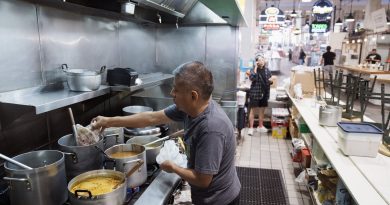Cash gifts, free milk raise risks to Thailand, Indonesia ratings

JAKARTA/BANGKOK – Southeast Asia’s new leaders risk blowing past budget constraints to make good on costly campaign promises of cash handouts and free lunches, increasing the risks to their prized investment-grade ratings.
Indonesia’s likely next President Prabowo Subianto plans to provide free meals and milk to more than 80 million school children across the country to combat extreme poverty and stunted physical development. The project is estimated to cost 120 trillion rupiah (US$7.7 billion) in its first year, before ramping up to 450 trillion rupiah annually by 2029.
Prabowo’s pledges including the food freebies are expected to widen the fiscal deficit in Southeast Asia’s largest economy to as high as 2.8% of gross domestic product (GDP) in 2025 from a projected 2.29% this year and after hitting a 12-year low in 2023.
In Thailand, Prime Minister Srettha Thavisin, also the finance minister, wants to give a 10,000-baht ($279) cash handout to almost every Thai adult in a bid to spur consumer spending and jolt the economy out of its sub-2% growth path. The so-called digital wallet scheme will cost the new government about $14 billion, to be funded entirely through borrowing.

Prime Minister Srettha Thavisin discusses ways to generate more revenue for the country at an economic forum in Bangkok on Feb 22, 2024. (Photo: Chanat Katanyu)
Such populist policies, on top of existing subsidies on consumers’ energy bills, have put investors and credit raters on alert as they threaten to stoke inflation and reverse the hard-won fiscal consolidation since the coronavirus pandemic. Opposition parties, economists and even the central bank in Thailand’s case have pushed back against the programs, saying targeted aid to the most needy would be cheaper and more effective.
Fitch Ratings has warned that medium-term fiscal risks have risen in Indonesia, while a persistent increase in debt and slowdown in economic growth would be rating negative for Thailand, according to Moody’s Investors Service and S&P Global Ratings.
“These new governments will find it challenging to back away from populist measures pushed in a heated campaign,” said Euben Paracuelles, Nomura Holdings Inc economist in Singapore. “As they stand, these policies would likely have a temporary growth impact at best,” with money better spent on more productive areas like infrastructure.
Global funds have sold a net $928 million in Thailand and Indonesian government bonds this year, even as the broader region attracted cash.
The baht has fallen about 6% against the dollar since the election in May last year, the worst performer among developing Asian currencies in that time period. In Indonesia, the rupiah has edged 0.1% lower against the dollar since the Feb 14 election, underperforming the Bloomberg Asia Dollar Index.
“The schemes certainly add to fiscal risks, however, a greater concern for us would be any related political uncertainty,” said Liam Spillane, head of emerging-market debt at Aviva Investors Global Services Ltd. in London. He has a moderately bearish outlook for Thai bonds and remains slightly bullish on Indonesian debt, pending more policy details post-election.
Southeast Asia’s leaders are increasingly turning to generous giveaways to curry favour among lower- and middle-income households that have fallen behind in the post-Covid economic rebound. Amid depleted savings and sticky inflation, living costs and social assistance have become key voter issues, even in well-off nations like Singapore.
“Thailand’s digital wallet handout is the most concerning, as the government has made clear that this will be funded entirely by debt,” said Bloomberg Economics’s Tamara Mast Henderson. “This will also be just a short-term cosmetic lift to growth. There’s no long term productive or structural benefit to the economy.”
More information is needed on Prabowo’s free food program, and at this stage it is “less of a worry” for the Bloomberg economist given Indonesia’s stronger growth prospects and lower debt burden than Thailand.

Presidential candidate Prabowo Subianto reacts while dancing as he claims victory after unofficial vote counts during an event to watch the results of the general election in Jakarta, Indonesia, on Feb 14, 2024. (Photo: Reuters)
Neighbouring Malaysia has likewise found it difficult to see through a long-promised plan to roll back blanket fuel subsidies, which contributed to the government’s subsidy bill exceeding an estimated 81 billion ringgit ($17 billion) last year. The government also needs to find new sources of revenue but has resisted reintroducing the unpopular goods and services tax that was scrapped in 2018 as part of an election pledge by then-leader Mahathir Mohamad.
“The sweeping subsidies during the (Covid-19) pandemic proved to be a means to gain support and some parts of the population find it hard to be weaned from them,” said Nicholas Mapa, a senior economist at ING Groep NV in Manila. “It looks like leaders and would-be leaders are willing to roll the dice on such moves at the cost of fiscal space.”
The programs come with trade-offs. Unleashing a huge wave of stimulus spending could stoke price pressures in Thailand and make it more difficult for the central bank to deliver the rate cut that Prime Minister Srettha has repeatedly clamoured for.
To avoid hitting the debt ceiling in Indonesia, the camp of president-to-be Prabowo has floated the idea of “fine-tuning” subsidies on diesel and cooking gas, which would also be deeply unpopular.
“Programs like these are hard to sustain,” said Trinh Nguyen, a senior economist at Natixis SA. “You can’t go on forever subsidising consumption.”
Source – Bangkok News




